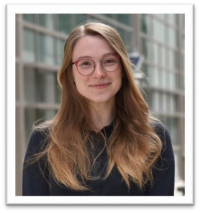Safe Real-World Autonomy in Uncertain and Unstructured Environments

Speaker: Sylvia Herbert
Affiliation: UC Berkeley
Abstract:
In this talk. I will present my current and future work towards enabling safe real-world autonomy. My core focus is to enable efficient and safe decision-making in complex autonomous systems, while reasoning about uncertainty in real-world environments, including those involving human interactions. These methods draw from control theory, cognitive science, and reinforcement learning, and are backed by both rigorous theory and physical testing on robotic platforms.
First, I will discuss safety for complex systems in simple environments. Traditional methods for generating safety analyses and safe controllers struggle to handle realistic complex models of autonomous systems, and therefore are stuck with simplistic models that are less accurate. I have developed scalable techniques for theoretically sound safety guarantees that can reduce computation by orders of magnitude for high-dimensional systems, resulting in better safety analyses and paving the way for safety in real-world autonomy.
Next, I will add in complex environments. Safety analyses depend on pre-defined assumptions that will often be wrong in practice, as real-world systems will inevitably encounter incomplete knowledge of the environment and other agents. Reasoning efficiently and safely in unstructured environments is an area where humans excel compared to current autonomous systems. Inspired by this, I have used models of human decision-making from cognitive science to develop algorithms that allow autonomous systems to navigate quickly and safely, adapt to new information, and reason over the uncertainty inherent in predicting humans and other agents. Combining these techniques brings us closer to the goal of safe real-world autonomy.
Biography:
Sylvia Herbert is a PhD candidate in Electrical Engineering and Computer Sciences at UC Berkeley. She works with Professor Claire Tomlin in the Hybrid Systems Lab and the Berkeley Artificial Intelligence Research (BAIR) Group. Her research interests are in developing theoretically sound techniques for efficiently guaranteeing safe control based on available models of systems and given information about environments. These techniques should be able to quickly adapt to unexpected changes and new information in the autonomous system or the environment. More information on her research interests can be seen at sylviaherbert.com. Sylvia has received the NSF GRFP, the UC Berkeley Chancello r’s Fellowship, the UC Berkeley Outstanding Graduate Student Instructor Award, and the Berkeley EECS Demetri Angelakos Memorial Achievement Award for Altruism.
For more information, contact Prof. Paulo Tabuada (tabuada@ee.ucla.edu)
Date/Time:
Date(s) - Jan 21, 2020
11:00 am - 12:30 pm
Location:
EE-IV Shannon Room #54-134
420 Westwood Plaza - 5th Flr., Los Angeles CA 90095
